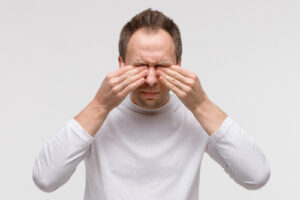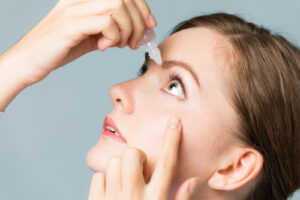Is It Dry Eyes or Allergies? Learn How to Tell the Difference
In addition to blooming flowers and warmer days, the springtime and early summer can mean irritated eyes for the millions of people with allergies. Allergies aren’t the only condition that can cause irritated eyes, though.
Dry eye syndrome is another common culprit. Since identifying the cause of your discomfort is necessary to determine the right solution, it’s important to know which is affecting you.
Keep reading to learn how to tell the difference between dry eyes and allergies!
How Does Dryness Affect the Eyes?
Of all eye conditions, dry eye syndrome is one of the most prevalent. It’s estimated that more than ten million Americans experience ocular dryness. It can be chronic or only occur in certain situations.
Dry eye syndrome most often stems from a problem involving tears. Tears lubricate the surface of the eye and help to focus light.
They also protect the eye from potential irritants like dirt and dust. When there is an issue with the quality or quantity of them, it can result in dry eye syndrome. 
Common symptoms of dry eye syndrome include:
- Burning or stinging sensations
- Redness
- Blurry vision
- Watery eyes
- Discomfort after periods of looking at something, like a book or TV
You have several special glands around your eyes that produce the different components of a tear. A tear does not only consist of water: it also contains mucus and oil.
All these layers are essential in order for a tear to be complete. Dry eye syndrome can occur as you get older.
This is because your body naturally starts producing less oil. It can also be more common in those who wear contacts, take certain medications, or have certain conditions.
Some environmental situations and lifestyle choices can lead to dryness. Hot, dry, and windy environments make it harder for your eyes to stay hydrated.
Smoking or long periods of looking at a screen can also dry out your eyes.
How Do Allergies Affect the Eyes?
Anyone who has experienced allergies knows how they leave your eyes feeling uncomfortable. Allergies occur when your immune system overreacts to a particular substance.

When your body comes in contact with an allergen, such as pollen, dust, or pet dander, it triggers an allergic response, which involves the production of a chemical called histamine. One result of this is that your eyes become inflamed.
Allergy symptoms include:
- Itchy eyes, nose, and throat
- Watery eyes
- Redness
- Congestion
- Sneezing and running nose
- Coughing
- Fatigue
Seasonal allergies are not the only kind that can affect your eyes. There are several different types of allergies that can occur year-round and result in ocular symptoms.
The Difference Between Dry Eye and Allergy Symptoms
Both conditions cause similar symptoms, but there are some differences.
The most noticeable indicator that you may have allergies is itchiness. 
Itchiness is not a common symptom of dry eye. It’s more of a gritty, scratchy, or stinging sensation.
So, if you’re feeling the urge to rub or flush out your eyes due to itchiness, you’re more likely to be experiencing allergies. Allergies also affect other parts of your body.
You might have a runny nose, sore throat, or cough. These are not associated with dry eye syndrome.
Do Allergies Make Dry Eye Symptoms Worse?
It is possible for a person to experience both allergies and dry eye syndrome. Having either one can lead to the development of the other, and worsening of symptoms.
When your eyes are already suffering from decreased tear production, it is harder for them to protect you from allergens. Also, if your eyes are already dry and irritated, you are more likely to rub your eyes, potentially introducing allergens that have gotten on your hands.
This can cause a cycle of worsening symptoms. In addition, allergies are often treated with antihistamine medications.
A side effect of these is that they lower your tear production, which, in turn, can cause dry eye syndrome.
Treating Dry Eye and Allergies
The key to treating dry eye and allergies is identifying what is causing your symptoms. The only way to be certain of this root cause is to visit your eye doctor.
 Your doctor can evaluate your symptoms and provide an accurate treatment plan. If they suspect dry eye, there are several tests to confirm whether this is the underlying cause.
Your doctor can evaluate your symptoms and provide an accurate treatment plan. If they suspect dry eye, there are several tests to confirm whether this is the underlying cause.
The treatment for dry eye varies significantly from that of allergies. Allergies are often treated with antihistamine medication, whether a pill or nasal spray.
Dry eyes are typically first treated with eye drops, or artificial tears. Sometimes, further treatment, such as meibomian gland expression or punctal plugs, is needed.
The sooner you identify the cause of your symptoms and the right kind of treatment, the sooner you can start feeling better.
Are irritated eyes making you miserable? Schedule an appointment at Complete EyeCare West in Columbus, OH, today!







